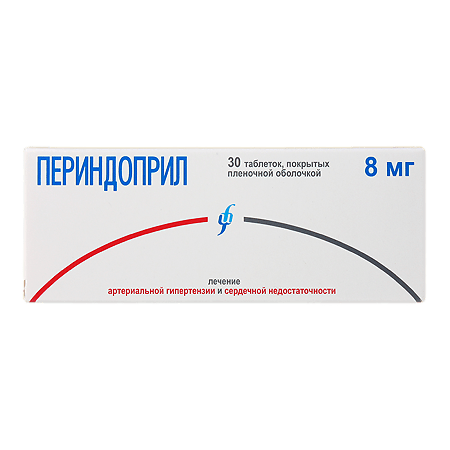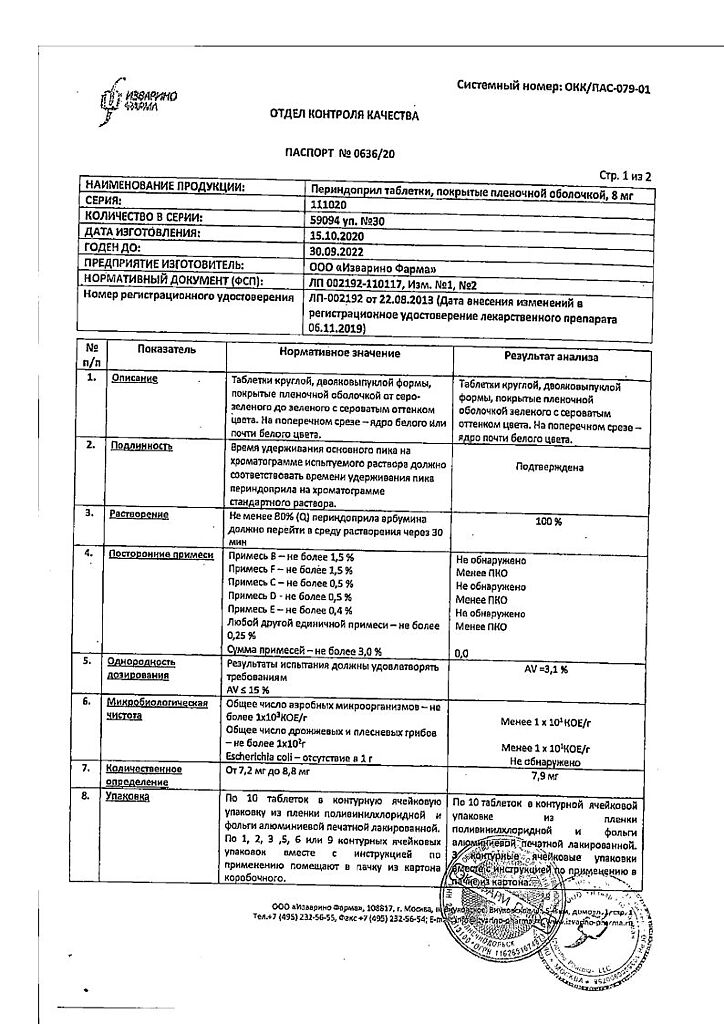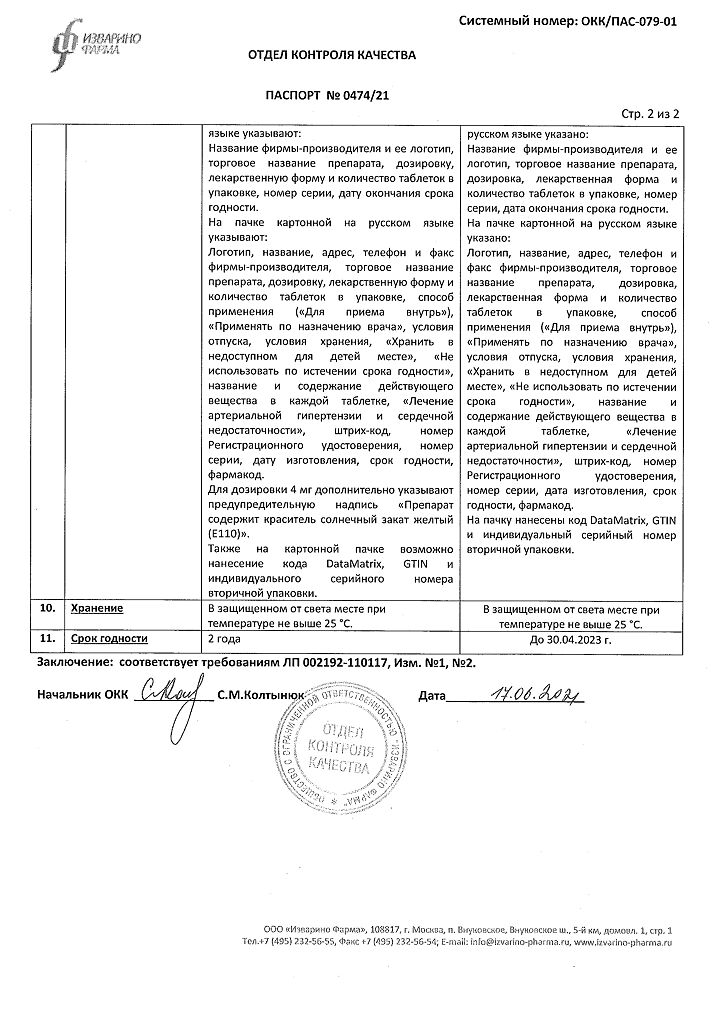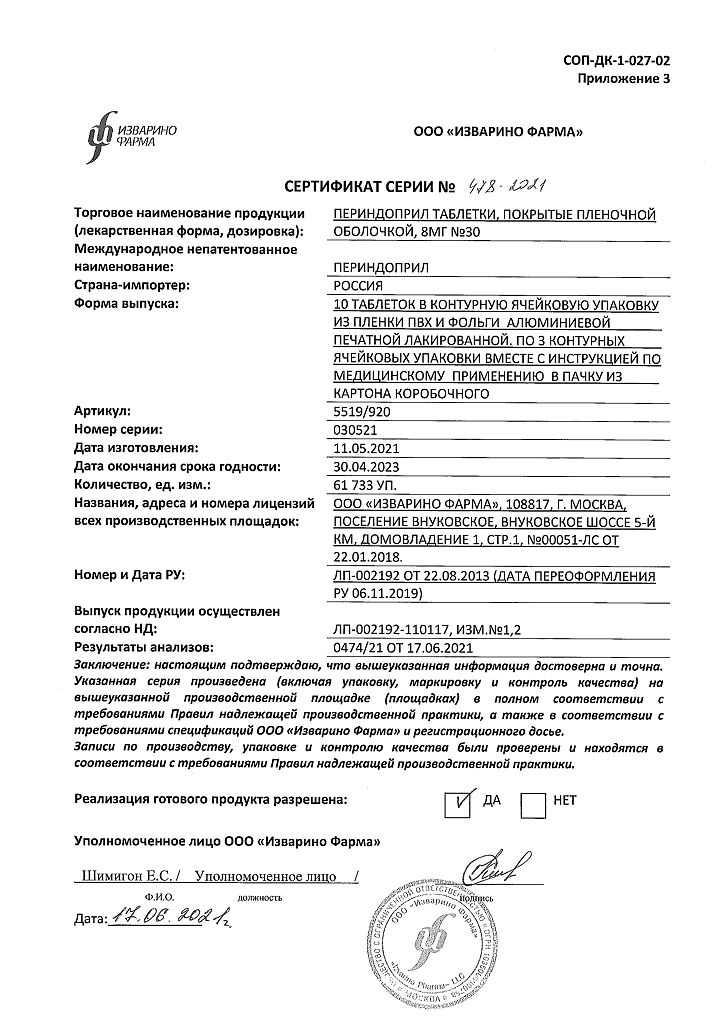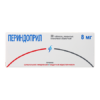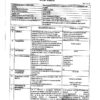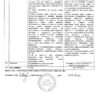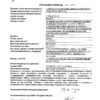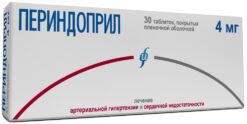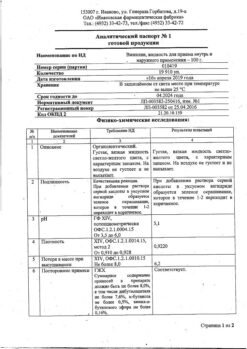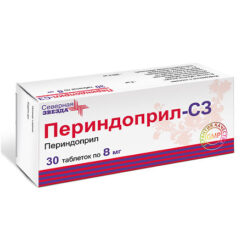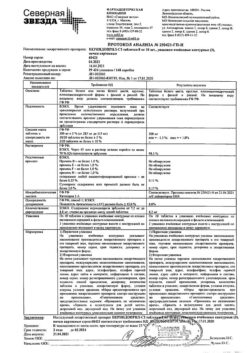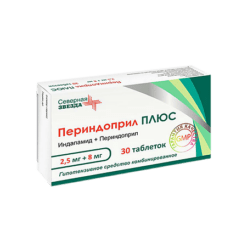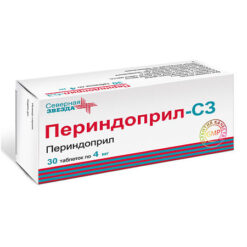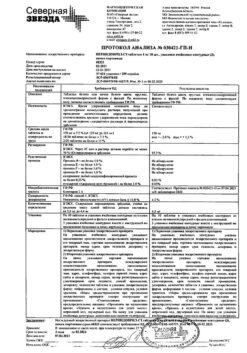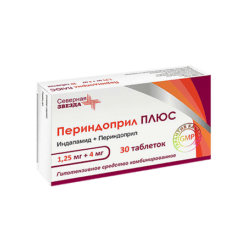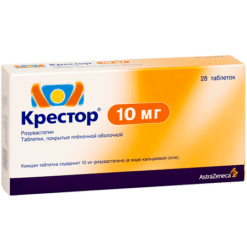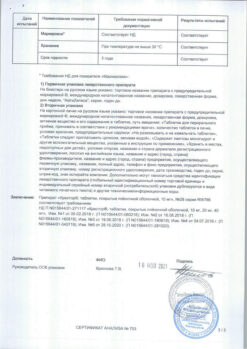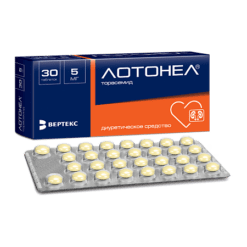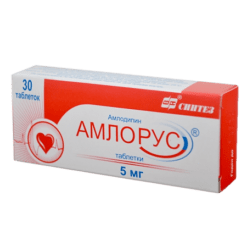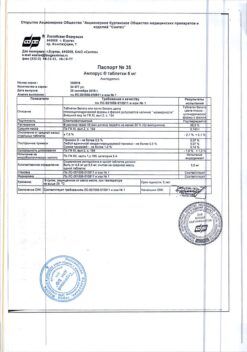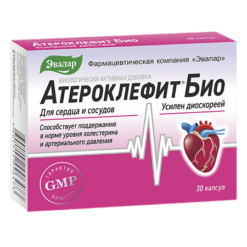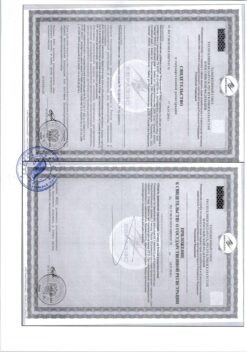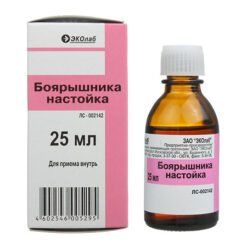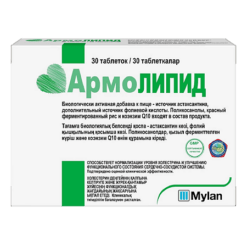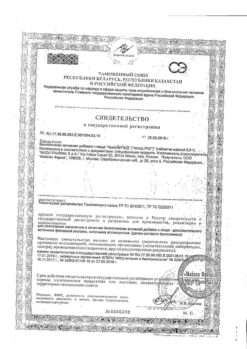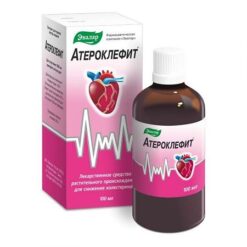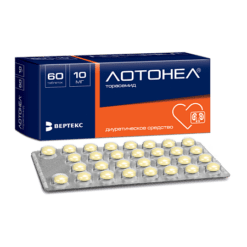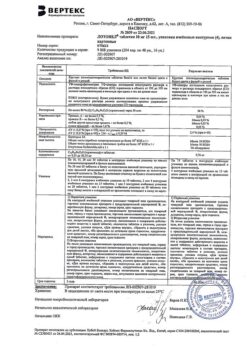No products in the cart.
Perindopril, 8 mg 30 pcs
€12.89 €11.28
Description
A ACE inhibitor. It is a prodrug from which the active metabolite perindoprilat is formed in the body. It is believed that the mechanism of antihypertensive action is associated with competitive inhibition of ACE activity, which leads to a decrease in the rate of conversion of angiotensin I into angiotensin II, which is a powerful vasoconstrictor. The decrease in angiotensin II concentration results in a secondary increase in plasma renin activity by eliminating the negative feedback of renin release and directly reducing aldosterone secretion. Due to its vasodilator effect, it decreases RPO (post-load), congestion pressure in the pulmonary capillaries (preload) and resistance in the pulmonary vessels; it increases cardiac minute volume and exercise tolerance.
Hypotensive effects develop within the first hour of perindopril administration, peak by 4-8 hours and last for 24 hours.
Pharmacokinetics
Perindopril is rapidly absorbed from the gastrointestinal tract after oral administration. Cmax is reached after 1 h. Bioavailability is 65-70%.
In metabolism perindopril is biotransformed to form the active metabolite – perindoprilat (about 20%) and 5 inactive compounds. Cmax of perindoprilat in plasma is reached between 3 and 5 hours after intake. Binding of perindoprilat to plasma proteins is insignificant (less than 30%) and depends on the concentration of the active substance. Vd of free perindoprilat is close to 0.2 l/kg.
It does not cumulate. Repeated administration does not lead to cumulation and T1/2 corresponds to the period of its activity.
The metabolism of perindopril is slowed when taken with food.
The T1/2 of perindopril is 1 hour.
Perindoprilat is excreted by the kidneys; T1/2 of its free fraction is 3-5 h.
In elderly patients and in renal and heart failure, excretion of perindoprilat is slower.
Indications
Indications
Arterial hypertension, chronic heart failure.
Pharmacological effect
Pharmacological effect
ACE inhibitor. It is a prodrug from which the active metabolite perindoprilat is formed in the body. It is believed that the mechanism of antihypertensive action is associated with competitive inhibition of ACE activity, which leads to a decrease in the rate of conversion of angiotensin I to angiotensin II, which is a powerful vasoconstrictor. As a result of a decrease in the concentration of angiotensin II, a secondary increase in plasma renin activity occurs due to the elimination of negative feedback during the release of renin and a direct decrease in aldosterone secretion. Thanks to its vasodilating effect, it reduces roundabout percentage (afterload), wedge pressure in the pulmonary capillaries (preload) and resistance in the pulmonary vessels; increases cardiac output and exercise tolerance.
The hypotensive effect develops within the first hour after taking perindopril, reaches a maximum at 4-8 hours and continues for 24 hours.
Pharmacokinetics
After oral administration, perindopril is rapidly absorbed from the gastrointestinal tract. Cmax is reached after 1 hour. Bioavailability is 65-70%.
During metabolism, perindopril is biotransformed to form an active metabolite – perindoprilate (about 20%) and 5 inactive compounds. Cmax of perindoprilat in plasma is achieved between 3 and 5 hours after administration. The binding of perindoprilate to plasma proteins is insignificant (less than 30%) and depends on the concentration of the active substance. Vd of free perindoprilate is close to 0.2 l/kg.
Does not cumulate. Repeated administration does not lead to accumulation and T1/2 corresponds to the period of its activity.
When taken with food, the metabolism of perindopril slows down.
T1/2 of perindopril is 1 hour.
Perindoprilat is excreted from the body by the kidneys; T1/2 of its free fraction is 3-5 hours.
In elderly patients, as well as in renal and heart failure, the elimination of perindoprilate slows down.
Special instructions
Special instructions
Use with caution in renal failure and severe arterial hypertension.
Before starting treatment with perindopril, a renal function test is recommended for all patients.
During treatment with perindopril, renal function, the activity of liver enzymes in the blood, and peripheral blood tests should be regularly monitored (especially in patients with diffuse connective tissue diseases, in patients receiving immunosuppressive drugs, allopurinol). Patients with sodium and fluid deficiency must undergo correction of water and electrolyte disturbances before starting treatment.
During treatment with perindopril, hemodialysis should not be performed using polyacrylonitrile membranes (the risk of anaphylactic reactions is increased).
Perindopril should be used with caution simultaneously with drugs that can cause an increase in potassium levels in the blood (indomethacin, cyclosporine). Concomitant use with potassium-sparing diuretics and potassium supplements is not recommended.
Active ingredient
Active ingredient
Perindopril
Composition
Composition
perindopril 8 mg.
Contraindications
Contraindications
History of angioedema, pregnancy, lactation, childhood, hypersensitivity to perindopril.
Use during pregnancy and breastfeeding
Perindopril is contraindicated for use during pregnancy and lactation (breastfeeding).
Use for renal impairment
In case of renal dysfunction, adjustment of the dosage regimen is required depending on the CC values.
Use in children
Contraindicated in children.
Side Effects
Side Effects
From the respiratory system: a dry cough is possible.
From the digestive system: dyspeptic symptoms, dry mouth, taste disturbances.
From the central nervous system: headache, sleep and/or mood disorders, dizziness; in some cases – convulsions.
From the hematopoietic system: decrease in hemoglobin level (especially at the beginning of treatment); rarely – a decrease in the number of red blood cells and/or platelets.
From the kidneys: a reversible increase in the level of creatinine and uric acid.
Allergic reactions: angioedema, skin rash, itching, erythema.
Other: sexual disorders.
Interaction
Interaction
When used simultaneously with antihypertensive drugs, muscle relaxants, and anesthetic agents, the antihypertensive effect may be enhanced.
When used simultaneously with loop diuretics and thiazide diuretics, the antihypertensive effect may be enhanced. Severe arterial hypotension, especially after taking the first dose of a diuretic, apparently occurs due to hypovolemia, which leads to a transient increase in the hypotensive effect of perindopril. The risk of kidney dysfunction increases.
When used simultaneously with sympathomimetics, the antihypertensive effect of perindopril may be reduced.
When used simultaneously with tricyclic antidepressants and antipsychotics (neuroleptics), the risk of developing postural hypotension increases.
When used simultaneously with indomethacin, the antihypertensive effect of perindopril is reduced, apparently due to inhibition of prostaglandin synthesis under the influence of NSAIDs (which are believed to play a role in the development of the hypotensive effect of ACE inhibitors).
When used simultaneously with insulin, hypoglycemic agents and sulfonylurea derivatives, hypoglycemia may develop due to increased glucose tolerance.
When used simultaneously with potassium-sparing diuretics (including spironolactone, triamterene, amiloride), potassium preparations, salt substitutes and dietary supplements containing potassium, hyperkalemia may develop (especially in patients with impaired renal function), because ACE inhibitors reduce the content of aldosterone, which leads to potassium retention in the body while limiting the excretion of potassium or its additional intake into the body.
When used simultaneously with lithium carbonate, it is possible to reduce the excretion of lithium from the body.
Manufacturer
Manufacturer
Izvarino Pharma, Russia
Additional information
| Manufacturer | Izvarino Pharma, Russia |
|---|---|
| Medication form | pills |
| Brand | Izvarino Pharma |
Other forms…
Related products
Buy Perindopril, 8 mg 30 pcs with delivery to USA, UK, Europe and over 120 other countries.

